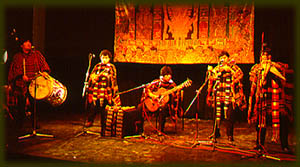|

The Name Rumillajta - pronounced roomy yokta - means 'city of stone' in Quechua, the language of the Incas. It conjures up the monumental stone ruins of ancient Andean cities such as Tiwanaku, Machu Picchu, and Iscanwaya. For the musicians, the name embodies a link between the past and the present Andean life.
Rumillajta's music has been likened to the exquisite textile art of Bolivia in its use of instrumental color and texture and is distinguished by innovative harmonies, rich instrumentation, and rhythmic complexity. It belongs to the mestizo (of mixed blood) tradition of the towns, as distinct from the roots music of the villages, and is renowned for its "extremely beautiful arrangements" (Rough Guide to World Music, UK). At once earthy and sophisticated, Rumillajta's music gives contemporary expression to a musical heritage with roots several thousands of years in the past. Closely tied to the natural world, Rumillajta's music is powerfully evocative. At times it portrays the cold bleakness of the windswept altiplano (the high plains) and at others the brilliant, spirited dances of the warm lowlands. Inspiration comes too from the lives of Andean people. Rumillajta's music encompasses contemporary political themes such as La deuda externa (the foreign debt), Hoja de Coca (coca leaf) and Los Mineros (the miners), as well as typical folk themes. Bolivia's rich folklore is the mainspring of Rumillajta's repertoire but music is gathered from all over the Andean region and at times includes folk music from other Latin American counties. Rumillajta arrange and perform folk tunes, their own compositions, and the music of other composers. Each song or dance rhythm performed by Rumillajta is a treasure trove of cultural information and history that fascinates audiences. All are part of a rich folk heritage that brings together the indigenous music of the rural Andes with its wind instruments and links to the agricultural cycle, the influence of the Spanish conquistadors who came with their stringed instruments, Hispanic tempos, and the Catholic feast calendar; and even some compelling dance rhythms handed down by the slaves brought from Africa to work the Andean silver mines. Carñavales, huayños, morenadas, cuecas and sanjuanitos are some of the colorful array of mestizo rhythms Rumillajta introduce and play to their audiences. The Andean values of sharing and interdependence influence their arrangements and are reflected in their interweaving of instrumental sounds; while pairing and duality, which are central to Andean philosophy, are demonstrated in the performances of the two panpipe players, who typically divide the melody between them, playing alternate notes, in the traditional manner.
Diana Scrafton |
||||||
 |
||
|
|




